
The Book of Judges is the seventh book of the Hebrew Bible and the Christian Old Testament. In the narrative of the Hebrew Bible, it covers the time between the conquest described in the Book of Joshua and the establishment of a kingdom in the Books of Samuel, during which biblical judges served as temporary leaders. The stories follow a consistent pattern: the people are unfaithful to Yahweh; he therefore delivers them into the hands of their enemies; the people repent and entreat Yahweh for mercy, which he sends in the form of a leader or champion ; the judge delivers the Israelites from oppression and they prosper, but soon they fall again into unfaithfulness and the cycle is repeated. Scholars consider many of the stories in Judges to be the oldest in the Deuteronomistic history, with their major redaction dated to the 8th century BCE and with materials such as the Song of Deborah dating from much earlier.
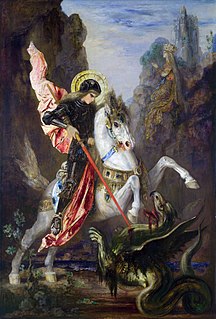
Christian mythology is the body of myths associated with Christianity. The term encompasses a broad variety of legends and narratives, especially those considered sacred narratives. Mythological themes and elements occur throughout Christian literature, including recurring myths such as ascending to a mountain, the axis mundi, myths of combat, descent into the Underworld, accounts of a dying-and-rising god, a flood myth, stories about the founding of a tribe or city, and myths about great heroes of the past, paradises, and self-sacrifice.

Irvine Welsh is a Scottish novelist, playwright and short story writer. His 1993 novel Trainspotting was made into a film of the same name. He has also written plays and screenplays, and directed several short films.

John Welsh was a Scottish Presbyterian leader. He was born in Dumfriesshire and attended the University of Edinburgh to obtain his MA in 1588. He became a minister in Selkirk and married Elizabeth Knox, a daughter of John and Margaret Knox, before leaving Selkirk. Welsh later ministered at Kirkcudbright and Ayr, the latter of which was where he spent five years. His preaching resulted in his imprisonment by the order of King James VI of Scotland. The lawyer Thomas Hamilton wrote to James VI about Welsh, John Forbes, and others; the case was important because many Scottish subjects of James were devoted to the ministers. In 1606 Welsh was exiled to France, where he continued to preach. John Welsh of Ayr was the father of Josias Welsh and the grandfather of John Welsh of Irongray.

Substitutionary atonement, also called vicarious atonement, is a central concept within Christian theology which asserts that Jesus died "for us", as propagated by the Western classic and objective paradigms of atonement in Christianity, which regard Jesus as dying as a substitute for others, "instead of" them.
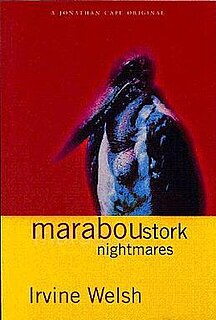
Marabou Stork Nightmares is an experimental novel by Irvine Welsh, and his second novel, published in the UK in 1995.

The Private Memoirs and Confessions of a Justified Sinner: Written by Himself: With a detail of curious traditionary facts and other evidence by the editor is a novel by the Scottish author James Hogg, published anonymously in 1824.

Filth is a 1998 novel by Scottish writer Irvine Welsh. A sequel, Crime, was published in 2008. It was adapted into a 2013 film of the same name, directed by Jon S. Baird with James McAvoy in the lead role.
The Heart of Mid-Lothian is the seventh of Sir Walter Scott's Waverley Novels. It was originally published in four volumes on 25 July 1818, under the title of Tales of My Landlord, 2nd series, and the author was given as "Jedediah Cleishbotham, Schoolmaster and Parish-clerk of Gandercleugh". The main action, which takes place between September 1736 and May 1737, is set in motion by the Porteous Riots in Edinburgh and involves an epic journey from Edinburgh to London by a working-class girl to obtain a royal commutation of the death penalty incurred by her sister for the alleged murder of her new-born baby. Despite some negative contemporary reviews, some now consider it Scott's best novel.

The temptation of Christ is a biblical narrative detailed in the gospels of Matthew, Mark, and Luke. After being baptized by John the Baptist, Jesus was tempted by the devil after 40 days and nights of fasting in the Judaean Desert. At the time, Satan came to Jesus and tried to tempt him. Jesus having refused each temptation, Satan then departed and Jesus returned to Galilee to begin his ministry. During this entire time of spiritual battle, Jesus was fasting.

The Battle of Drumclog was fought on 1 June 1679, between a group of Covenanters and the forces of John Graham of Claverhouse, at Drumclog, in South Lanarkshire, Scotland.
Perceton is a medieval settlement and old country estate in North Ayrshire, Scotland, near the town of Irvine. The ruined church in Perceton is one of the oldest buildings in the Irvine district. The earliest legible gravestone dates from 1698, though older stone coffins will certainly still rest deep within the small hillock on which the chapel and graveyard sit.
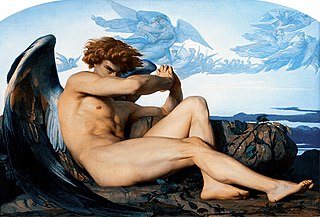
In Christianity, the Devil is the personification of evil, who rebelled against God in an attempt to become equal to God himself. He is depicted as a fallen angel, who was expelled from Heaven at the beginning of time, before God created the material world, and is in constant opposition to God. The devil is identified with several figures in the Bible including the serpent in the Garden of Eden, Lucifer, Satan, the tempter of the Gospels, Leviathan, and the dragon in the Book of Revelation.
James Robertson is a Scottish writer who grew up in Bridge of Allan, Stirlingshire. He is the author of several short story and poetry collections, and has published six novels: The Fanatic, Joseph Knight, The Testament of Gideon Mack, And the Land Lay Still, The Professor of Truth, and To Be Continued…. The Testament of Gideon Mack was long-listed for the 2006 Man Booker Prize.
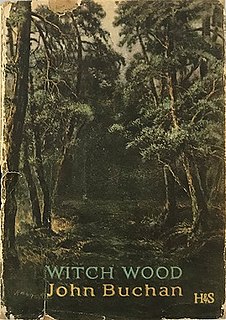
Witch Wood is a 1927 novel by the Scottish author John Buchan that critics have called his masterpiece. The book is set in the Scottish Borders during the Wars of the Three Kingdoms, and combines the author's interests in landscape, 17th century Calvinism, and the fate of Scotland. A significant portion of the dialogue is in Scots.
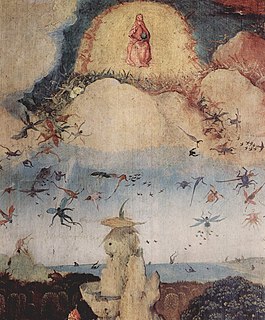
In the New Testament of the Christian Bible, the Book of Revelation describes a war in heaven between angels led by the Archangel Michael against those led by "the dragon", identified as the devil or Satan, who will be defeated and thrown down to the earth. Revelation's war in Heaven is related to the idea of fallen angels, and possible parallels have been proposed in the Hebrew Bible and the Dead Sea Scrolls.
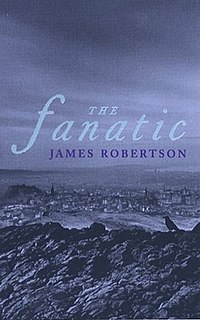
The Fanatic is a novel written by the Scottish author James Robertson, first published in 2000.
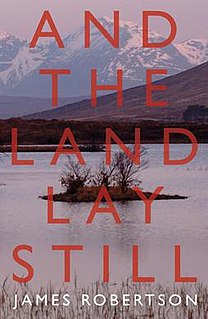
And the Land Lay Still is the fourth novel by Scottish novelist and poet James Robertson. Upon publication in 2010 it was widely praised for its breadth of exploration of Scottish society in the latter half of the 20th century.

Filth is a 2013 black comedy crime film written and directed by Jon S. Baird, based on Irvine Welsh's 1998 novel Filth. The film was released on 27 September 2013 in Scotland, 4 October 2013 elsewhere in the United Kingdom and in Ireland, and on 30 May 2014 in the United States. It stars James McAvoy, Jamie Bell, and Jim Broadbent.
John Spottiswood (1510–1585) was a religious reformer in 16th century Scotland.
















